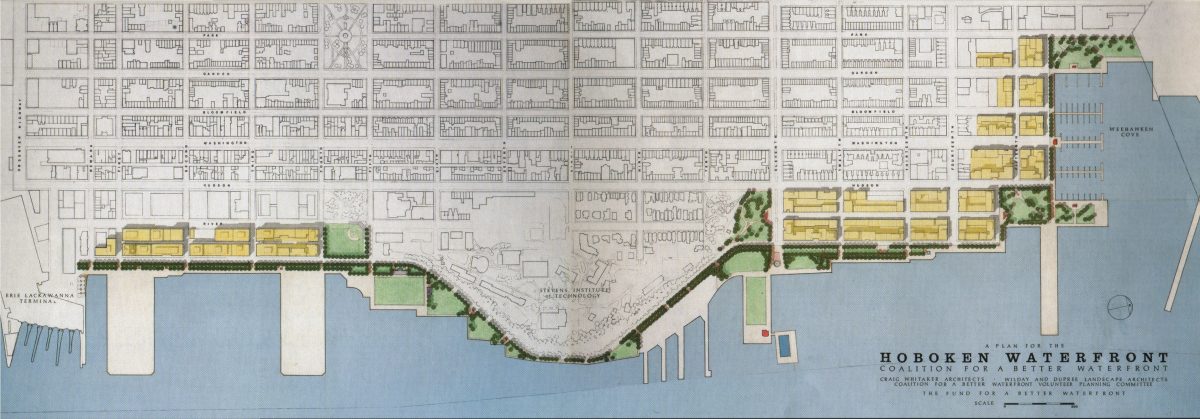On Wednesday, July 10, the Hoboken City Council will cast a final vote on two amendments to the Municipal Open Space Trust Fund (OSTF) that would be subject to a referendum vote in November. Assuming the Council and then Hoboken’s voters approve, funding would be available to pay off the bond to acquire the Union Dry Dock site and also to build the park there. The former Union Dry Dock property is one of the few sites left where additional public parkland can be secured in Hoboken. Building the park there would close a key missing link in Hoboken’s waterfront park, connecting Castle Point Park to Maxwell Place Park.
In November 2007, the voters of Hoboken went to the polls and overwhelmingly approved by a 10 to 1 margin the OSTF that, for the past 11 years, has provided a dedicated revenue stream to acquire and build new parkland. Despite the addition of 11 acres of public parkland since the creation of this fund, Hoboken continues to suffer from a deficit of open space. The current ratio of 1 acre per 1,000 residents is well below New York City’s standard of 2.5 acres and the national standard of 6.25 to 10.5 acres per 1,000 residents.
After a 17-month battle with NY Waterway and a failure of the Governor’s office to bring about a resolution, Mayor Bhalla has re-initiated an effort to take the Union Dry Dock site through eminent domain. Once a new appraisal of the fair-market value of the property is completed, the City will make an offer to the owner, NY Waterway. If the owner declines the offer or fails to negotiate in good faith, the City will proceed to acquire the site through eminent domain.
Hoboken’s OSTF currently generates over $2 million annually at a rate of 2 cents per $100 of assessed value. So, if someone’s home has an assessed value of $500,000, $100 annually of this owner’s taxes is dedicated to the OSTF. One ordinance would increase the rate by 1 cent, thus increasing the annual OSTF revenue by 50 per cent, an additional $1 million annually. It would also allow up to 25% of the funds to be used for historic preservation purposes.
The current OSTF ordinance requires that 75% of the funds be dedicated to acquisition. The second ordinance would amend the language to include construction costs, thus freeing up additional funds to build parks.
In addition to Hoboken’s OSTF, the City has been able to tap into the Hudson County Open Space Trust Fund. They have also obtained low-interest loans through the New Jersey Environmental Infrastructure Trust Fund. These low-interest loans plus a $20 million bond approved by the City Council in 2011 for open space purposes, can be paid back through the annual revenue generated from the Municipal OSTF. Other federal and state funding sources are being explored by the City as well as FBW. Since the 1990s, prior to the passage of the OSTF, Hoboken’s waterfront parks were funded primarily through Port Authority funds, a series of state and federal grants, and private developers. Since 2007, nearly all of the OSTF has been dedicated to SW Park and the BASF site, also known as NW Park.
For nearly 30 years, the people of Hoboken and FBW have sought to realize the vision of a contiguous, public waterfront park along the Hudson River in Hoboken. The potential is now in hand to complete several of the last missing links: Union Dry Dock, the Weehawken Cove and the Monarch pier. This is a rare opportunity that cannot be squandered. The land at the Weehawken Cove is owned by the City and will be built as a 4-acre park through the federal Rebuild by Design project. The Monarch pier case, originally designated for open space, is headed to the New Jersey Supreme Court and could be resolved by the end of this year.
A park at the Union Dry Dock would add over three acres of land as public open space along the waterfront, facing the remarkable New York City skyline and the wealth of open space over the Hudson River. The fishing, skateboarding, kayaking, children’s playgrounds and other recreational activities that currently take place there would be thus be spared from noxious diesel fumes and constant ferry traffic that would be generated if Union Dry Dock were used for a ferry refueling/maintenance facility, as proposed by NY Waterway and NJ Transit.
NOTE: The increase in the millage rate for the Open Space Trust Fund from 2 to 3 cents per $100 assessed value is not a tax increase. The amount of taxes one pays is determined by the City once it adopts its annual budget.
Related links
Making up Hoboken’s open space deficit at the waterfront & how to fund it
Public parks provide essential benefits
Col. Stevens vision for Hoboken still valid 200 years later
Editorial: A Once-in-a-century Opportunity
NJ-APA 2013 Great Places in NJ
Plan for the Hoboken Waterfont
Hoboken’s first parks established in 1804



